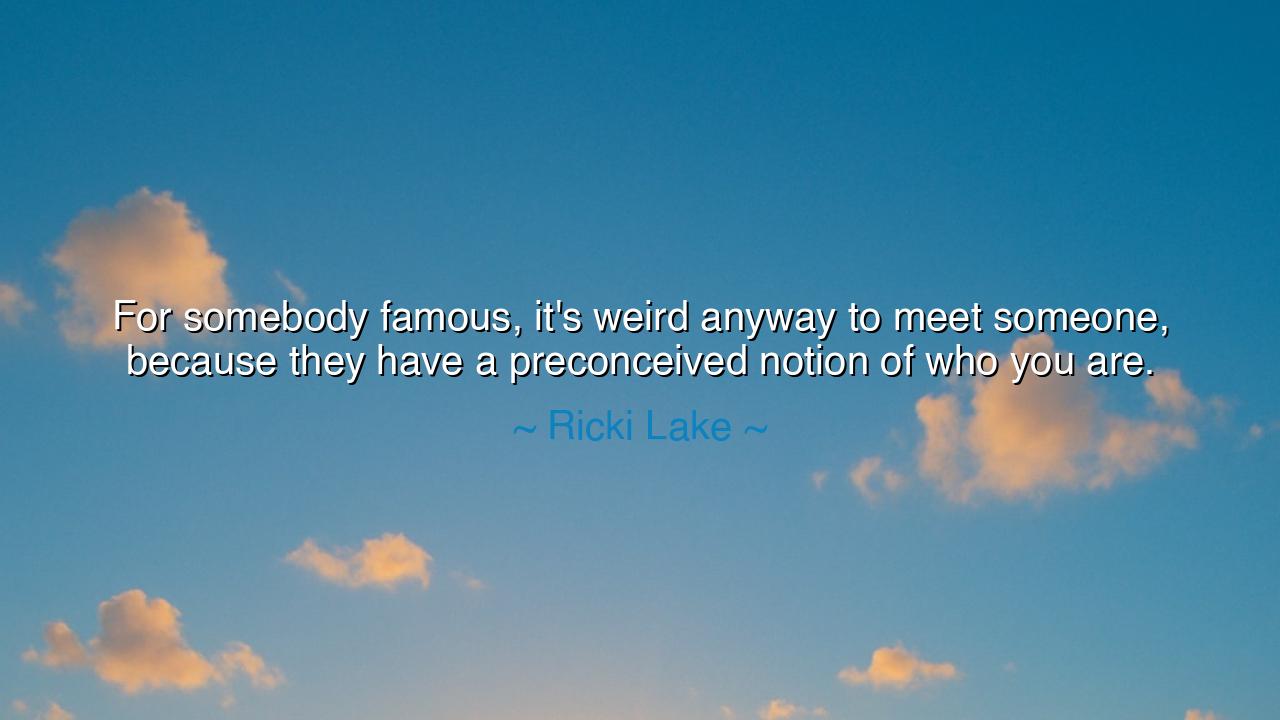
For somebody famous, it's weird anyway to meet someone, because
For somebody famous, it's weird anyway to meet someone, because they have a preconceived notion of who you are.






Host: The calm of the evening settled into the room, creating a peaceful atmosphere where reflection could take place. Jack sat at the table, his fingers lightly resting on his cup, absorbed in Ricki Lake’s words. Jeeny stood near the window, her gaze directed outward as she contemplated the deeper meaning behind the statement.
Jeeny: “I’ve been thinking about what Ricki Lake said: ‘For somebody famous, it’s weird anyway to meet someone, because they have a preconceived notion of who you are.’ It’s such an interesting perspective, isn’t it? The idea that fame doesn’t just create recognition—it creates expectations, and those expectations often don’t align with who the person really is.”
Jack: “Yes, exactly. Lake is pointing out that when someone is famous, people don’t meet them as they are—they meet the version of them that’s been shaped by the media, by public perception, and by the roles they’ve played in the public eye. Those preconceived notions can be limiting, because they only allow people to see the parts of a person they’re familiar with, not the full picture.”
Jeeny: “Right. And that can create a kind of disconnect, don’t you think? When people see you through the lens of fame or media, they forget that you’re just a person with your own complexities, your own experiences. They start to treat you as an image, rather than a real human being, which makes it difficult to have an authentic connection. Lake is really pointing to the isolation that fame can sometimes create.”
Host: The stillness in the room deepened, as they both considered how fame shapes not only the way others see you, but the way you experience the world. Jack’s fingers rested on the table, while Jeeny’s gaze softened, reflecting on the difficulty of navigating relationships when others see you through the lens of a public persona.
Jack: “It makes me think about how much of fame is about perception rather than reality. People think they know you because they’ve seen you in movies, on TV, or in interviews, but they don’t know your true self. They’ve built an image of you in their minds based on limited exposure. And that can be hard for someone famous to navigate because it’s difficult to meet people as a fully realized person when they already have a predefined idea of who you are.”
Jeeny: “Yes, and it’s also about how that perception can limit the way others interact with you. If they only see you as a certain character or public figure, they can start treating you as if that’s your entire identity. It can be frustrating, even alienating, because it’s like you’re being seen only for the parts of yourself that fit the narrative others have created. It doesn’t leave much room for authenticity or growth in how you connect with people.”
Jack: “Exactly. And what’s even more challenging is that, for the famous person, it can make it hard to find genuine relationships. When everyone approaches you with preconceived notions, it becomes difficult to know who truly sees you for who you are, not just as a celebrity. Lake is really pointing out how fame forces people to relate to a version of you that’s been constructed by outside influences, not necessarily one that reflects your true self.”
Jeeny: “Yes, and I think it’s also about the pressure of living up to those preconceived notions. People expect you to act or be a certain way based on what they’ve seen or heard. And that can create a kind of performance, where you’re constantly trying to meet others’ expectations instead of just being yourself. It’s exhausting, and it makes it hard to find those real connections with people.”
Host: The quiet in the room deepened as they reflected on the isolating effects of fame and the difficulty of building authentic relationships when people’s perceptions are clouded by public personas. Ricki Lake’s words had sparked a deeper reflection on the challenges of being famous—not just in terms of the attention, but in the way that attention creates a barrier between who you really are and who others think you are. Jack leaned back slightly in his chair, while Jeeny’s gaze turned from the window back to him, both of them understanding the complexity of navigating life in the public eye.
Jack: “So, Lake is showing us that fame creates a kind of filter between the person and the world around them. It forces people to relate to you through a lens of preconceived ideas, which makes it difficult to have genuine, unguarded interactions. The challenge is that people forget you’re just a person with your own complexities.”
Jeeny: “Exactly. And it’s about the disconnect that comes from only being seen through a public image. Lake is highlighting how important it is for people to remember that celebrities are humans first and foremost. They’re not just characters on a screen or personas we see in magazines—they have depth, they have feelings, and they have their own lives beyond the public eye.”
Host: The evening had fully settled in, the quiet understanding between them a reminder that fame, while often seen as glamorous, comes with its own set of challenges, particularly in terms of relationships and personal identity. Ricki Lake had reminded them that preconceived notions based on fame or public personas can create barriers that make it hard to connect with others authentically. The world outside had darkened, but inside, there was light—a recognition that authenticity is difficult to maintain when others see you through the lens of expectation, rather than as a real, complex individual.






AAdministratorAdministrator
Welcome, honored guests. Please leave a comment, we will respond soon